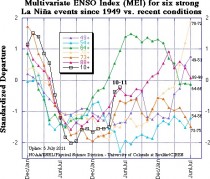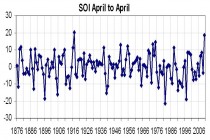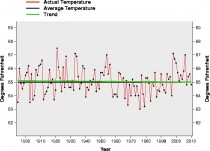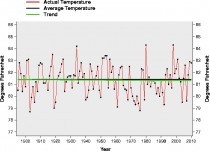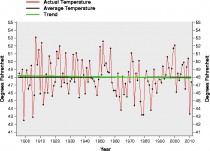By Joseph D’Aleo, CCM, AMS Fellow, Weatherbell co-chief Meteorologist
Tom Nelson reports: Warmist Andrew Dessler resurfaces with a laughable suggestion: If we pay a climate swindle tax, the climate won’t change
Texas is vulnerable to warming climate | Viewpoints, Outlook | Chron.com - Houston Chronicle
As you sit by the pool and sweat this summer, one book you should be reading is The Impact of Global Warming on Texas (University of Texas Press, June 2011, second edition).
...
It is a particularly appropriate read as we suffer through the hellish summer of 2011. While it is unknown exactly how much human activities are contributing to this summer’s unpleasant weather, one lesson from the book is clear: Get used to it. The weather of the 21st century will be very much like the hot and dry weather of 2011.
...
There are few qualified atmospheric scientists who would argue with the assessment in the book. And there are none in Texas. Attempts over the last few years to stage a debate in Texas about the science of climate change have required flying a skeptic in from out of state.
...This summer, for example, Texans with air conditioning are paying quite a bit more for electricity to cool their houses than they have in the past.
...
Thus, there is no free lunch: Either we pay to reduce emissions of greenhouse gases or we pay for the impacts of a changing climate.
Economists have looked at this problem repeatedly over the last two decades and virtually every mainstream economist has concluded that the costs of reducing emissions are less than the costs of unchecked climate change - the only disagreement is on the optimal level of emissions reductions.
... First, we need to stop arguing about science.
---------
Alarmists like Dessler have said we tend to confuse weather and climate, but they never miss an opportunity with heat or cold, flood or drought, unusual snow, tornado outbreaks or even dust or tsunamis to try and use weather extremes to scare the public into adopting their favored policies.
I had posted a few weeks ago a story on Texas Drought in Perspective featuring Dessler cohort but real scientist at Texas A&M, John Neilson Gammon. He noted this very serious drought was similar to 1918 and 1956 both very strong La Ninas. In fact using the Multivariate ENSO Index (MEI). 2010/11’s La Nina fell just behind 1955 summer peak in th 1954-1956 La Nina (negative MEI is La Nina) and using the Southern Oscillation Index from Australia’s BOM, it is the second strongest behind 1918 in the 1916-1918 La Nina (positive SOI is La Nina).
Looking at Texas annual, summer and winter temperature trends from NCDC tells us no warming has taken place in 117 years.
If they are are having to import scientists into Texas, maybe its because with the exception of Gammon and a few at UAH, a real scientist is so hard to find there, certainly at A&M. Andrew stick to clouds.
----------
Following the never less a good crisis go to waste, Joe Romm follows Dessler into the world of hyper and hyperbole
Romm Hysterical About The Drought - Blames It On Global Warming
Posted on July 12, 2011 by stevengoddard
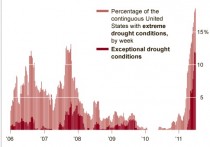
Nearly a fifth of the contiguous United States has been faced with the worst drought in recent years.
Joe being the charlatan that he is, didn’t bother to mention that drought conditions have been much worse in the past - on many occasions.
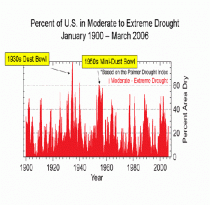
http://www.ogc.doc.gov/
By Jon Swaine, New York
Governments must invest three per cent of world GDP - about $2 tillion in 2010 - annually for 40 years to stop climate change and famine, according to the UN’s department of economic and social affairs.
At least $1.1 trillion of that will need to be spent each year in developing countries, in order to meet their populations’ increasing demands for resources, the 2011 World Economic and Social Survey said.
Rob Vos, the lead author of the report, said that “business as usual is not an option” if the world were to “reverse the ongoing ecological destruction”.
His report said that to feed a rapidly growing number of mouths, farmers around the world will have to essentially double total international food production between now and 2050.
But to do this sustainably would require huge spending on “clean” energy production, on reducing the non-bio-degradable waste and on other improvements to farming and forestry techniques, it said.
The broader analysis prompted a rise of about 50 per cent in the amount of money said to be required to make human life sustainable. Last year’s survey called for spending of up to $1.2 trillion a year.
The report said that the extent of technological transformation required was greater in scale, and must be done more quickly, than the industrial revolution.
“It is rapidly expanding energy use, mainly driven by fossil fuels, that explains why humanity is on the verge of breaching planetary sustainability boundaries,” the report said.
“A comprehensive global energy transition is urgently needed in order to avert a major planetary catastrophe.”
See post and comments.
“We’ve got to ride the global warming issue. Even if the theory of global warming is wrong, we will be doing the right thing, in terms of economic policy and environmental policy.” Timothy Wirth quoted in Science Under Siege by Michael Fumento, 1993. Tim Wirth once US senator i now President of the UN Foundation.
“One has to free oneself from the illusion that international climate policy is environmental policy.” Instead, climate change policy is about how “we redistribute de facto the world’s wealth...” UN IPCC’s Ottmar Edenhofer.
By James Delingpole
The headline of this post really shouldn’t be controversial. It chimes perfectly with what Kevin “null hypothesis” Trenberth wrote in that notorious 2009 Climategate email to Michael Mann:
The fact is that we can’t account for the lack of warming at the moment and it is a travesty that we can’t.
And it’s what Phil Jones admitted in a BBC interview when he said that there had been no “statistically significant” warming since 1995.
Why then am I mentioning it now? W-e-l-l, because just as ze war is to the Germans, Chappaquiddick is to the Kennedy family and that Portland masseuse incident to Al Gore, so the recent lack of warming is to the, er, Warmists. They hate it. It’s an affront to everything they believe in. Damn it, if the world isn’t warming with the alacrity they’d prefer, how are they going to keep the funding gravy train going, and how are they going to persuade an increasingly sceptical populace that the “science” is “settled”, the debate over and the time for action is now? That’s why they can’t reminded of the truth often enough. It’s like salting the slugs that are ruining your garden: necessary, but also kind of fun too.
Consider their latest desperate effort in fudge, denial, and duplicity. It concerns a new report which - if you believe the Guardian and Michael Mann - confirms that man-made global warming is even more man-made and more happening and more dangerous than at any time ever.
Michael E Mann, at Pennsylvania State University and not part of the research team, said the study was “a very solid, careful statistical analysis” which reinforces research showing “there is a clear impact of human activity on ongoing warming of our climate”. It demonstrated, Mann said, that “the claim that ‘global warming has stopped’ is simply false.”
Actually the paper Reconciling anthropogenic climate change with observed temperature 1998-2008 [PDF] by a team led by Robert Kaufmann at the Department of Geography at Boston University demonstrates no such thing. What it shows - yet again and in excelsis - is the chutzpah and threadbare desperation of the “scientists” involved in the Great Global Warming Boondoggle. Rather than admit that their Ponzi scheme is dead in the water, they try to dazzle us with new imaginative theories which prove that, even though they’re wrong they are in fact right.
No global warming since 1998? Simple. All you’ve got to do - as Kaufmann et al have done [ is apply the Even Though We’re Wrong We’re Right Panacea Get-Out Formula. In this instance the ETWWWRPGOF (as it’s snappily known) involves Blaming The Chinese. Yep, it turns out all that pollution that Chinese are pumping into the air thanks to their unhealthy obsession with economic growth and giving better lives to their children is actually counteracting the effects of Man Made Global Warming.
“Results indicate that net anthropogenic forcing rises slower than previous decades because the cooling effects of sulfur emissions grow in tandem with the warming effects greenhouse gas concentrations. This slow-down, along with declining solar insolation and a change from El Nino to La Nina conditions, enables the model to simulate the lack of warming after 1998,” the team explains.
In other words Man Made Global Cooling is cancelling out Man Made Global Warming.
Judith Curry is unimpressed:
“Their argument is totally unconvincing to me. However, the link between flat/cooling global temperature and increased coal burning in China is certainly an interesting argument from a political perspective. The scientific motivation for this article seems to be that that scientists understand the evolution of global temperature forcing and that the answer is forced variability (not natural internal variability), and this explanation of the recent lack of warming supports a similar argument for the cooling between 1940 and 1970. The political consequence of this article seems to be that the simplest solution to global warming is for the Chinese to burn more coal, which they intend to do anyways.”
As is David Whitehouse at the GWPF:
“Tweaking computer models like this proves nothing. The real test is in the real world data. The temperature hasn’t increased for over a decade. For there to be any faith in the underlying scientific assumptions the world has to start warming soon, at an enhanced rate to compensate for it being held back for a decade.”
Despite what the authors of this paper state after their tinkering with an out-of-date climate computer model, there is as yet no convincing explanation for the global temperature standstill of the past decade.
As indeed might you and I be. For years the Warmists have been telling us that they’re so sure of their computer models that they know, they just know, that CO2 has a forcing effect on global temperatures and that combined with positive feedbacks this is going to cause catastrophic warming. And now they’re saying, without a blush, “Well all right, some of those feedbacks might actually be negative and, er, completely cancel out the terrifying thing we were telling you to worry about. But don’t stop worrying, for God’s sake. Whatever is happening is still worrying, very worrying. And if you give us a bit more time we’ll come up with a paper explaining just why it’s worrying.”
Meanwhile, further evidence emerges that “science” informing the IPCC’s prognostications of Man Made Climate Doom is junk science. It comes courtesy of Nic Lewis, the man who helped expose the flaws in a paper about Antarctic temperature trends, who has now noticed another instance in which the IPCC has been torturing innocent data - sorry: made a perfectly innocent mistake quite accidentally with no bad intention whatsoever - to suit its twisted ends.
The IPCC Fourth Assessment Report of 2007 (AR4) contained various errors, including the well publicised overestimate of the speed at which Himalayan glaciers would melt. However, the IPCC’s defenders point out that such errors were inadvertent and inconsequential: they did not undermine the scientific basis of AR4. Here I demonstrate an error in the core scientific report (WGI) that came about through the IPCC’s alteration of a peer-reviewed result. This error is highly consequential, since it involves the only instrumental evidence that is climate-model independent cited by the IPCC as to the probability distribution of climate sensitivity, and it substantially increases the apparent risk of high warming from increases in CO2 concentration.
Matt Ridley explains the significance of this better than I can:
This mistake is central to the IPCC’s case, not peripheral. It undermines the credibility of the case for urgent action against climate change and strongly supports the argument that, other things being equal, CO2 doubling will not cause more than a mild and net beneficial warming.
Now can we have our economy back, please?
----------------
Dr. Doug Hoyt, formerly chief scientist at Raytheon adds:
These manmade aerosol clouds are very local affairs. The English aerosol cloud barely made it to Norway and measurements in Belgium do not detect it. Nor was it seen in Ireland. Because the GCMs showed too much warming in the 20th century, the modellers needed a way to reduce the rate of warming, as well as explain the 1940-1976 cooling. They ignored all the aerosol measurements and invented aerosol dust clouds based upon industrial activity. The fabricated aerosol amounts used in the GCMs have no relationship to reality, but they do allow the modellers to continue to claim high climate sensitivity. It is also a conveninent adjustable parameter that makes the models have successful hindcasts. Finally it allows them to claim that natural variability does not exist. So it is a win-win-win situation for the modellers. But it is all false. Over the years, the very bad climate science has morphed from incompetence into fraud.



